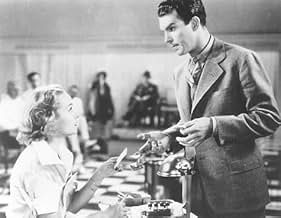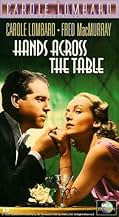CALIFICACIÓN DE IMDb
6.9/10
2.2 k
TU CALIFICACIÓN
Agrega una trama en tu idiomaA loafer and a manicurist, both planning to marry money, meet and form an uneasy alliance.A loafer and a manicurist, both planning to marry money, meet and form an uneasy alliance.A loafer and a manicurist, both planning to marry money, meet and form an uneasy alliance.
- Dirección
- Guionistas
- Elenco
- Premios
- 3 premios ganados en total
Peter Allen
- Jewelry Clerk
- (sin créditos)
Murray Alper
- Cabbie
- (sin créditos)
Sam Ash
- Maitre d'Hotel
- (sin créditos)
Herman Bing
- Barber
- (sin créditos)
Ralph Brooks
- Restaurant Patron
- (sin créditos)
Sterling Campbell
- Barber
- (sin créditos)
Whitey the Cat
- Cat
- (sin créditos)
Albert Conti
- Maitre d' in Speakeasy
- (sin créditos)
Marcelle Corday
- Celeste
- (sin créditos)
Nell Craig
- Saleswoman
- (sin créditos)
William Demarest
- Natty
- (sin créditos)
Opiniones destacadas
Hands Across the Table is the first of four films that Paramount teamed Fred MacMurray and Carole Lombard in. It's one of MacMurray's earliest film and he's playing what he would perennially be typecast as, a light leading man. That is until Double Indemnity showed just how dramatic he could be.
The hands across the table refer to those hands that a manicurist deals with and Lombard is a manicurist. This is the middle of the Great Depression and Lombard working in a hotel figures she can snag a millionaire. She actually does in the person of Ralph Bellamy.
But figuring to trade higher she meets Fred MacMurray who has the nice WASPy rich sounding name of Theodore Drew III. Problem is as he says to Lombard, the family fortune crashed in 1929. He's set his sights on a rich heiress, Astrid Allwyn, who will be able to support him in the style he was previously accustomed to.
Director Mitchell Leisen keeps the proceedings light and airy and its obvious that MacMurray and Lombard are suited for each other on the screen. No accident that they made three successive films, all of them money makers.
Funniest scene in the film how MacMurray scares away William Demarest as a prospective suitor for Lombard. Worth the price of the VHS tape alone.
The hands across the table refer to those hands that a manicurist deals with and Lombard is a manicurist. This is the middle of the Great Depression and Lombard working in a hotel figures she can snag a millionaire. She actually does in the person of Ralph Bellamy.
But figuring to trade higher she meets Fred MacMurray who has the nice WASPy rich sounding name of Theodore Drew III. Problem is as he says to Lombard, the family fortune crashed in 1929. He's set his sights on a rich heiress, Astrid Allwyn, who will be able to support him in the style he was previously accustomed to.
Director Mitchell Leisen keeps the proceedings light and airy and its obvious that MacMurray and Lombard are suited for each other on the screen. No accident that they made three successive films, all of them money makers.
Funniest scene in the film how MacMurray scares away William Demarest as a prospective suitor for Lombard. Worth the price of the VHS tape alone.
"Hands Across the Table" is a sparkling and enjoyable screwball romance, directed with an airy grace by the underrated Paramount stylist Mitchell Leisen, whose "Easy Living"(1937) and "Swing High, Swing Low"(1937) are two of the greatest classics of the 1930s. "Hands" is a minor work to be sure, but it is enjoyable and worthwhile for showcasing the comedic talents of Carole Lombard as the gold-digging manicurist who falls for a former millionaire playboy, played by Fred MacMurray. Ralph Bellamy plays Lombard's rejected suitor, a role that somehow prefigures his role in Hawks' "His Girl Friday".
...then you ought to rent this movie. She is just adorable, and charming beyond belief, as avowed gold-digger Regi Allen. All the supporting players here are wonderful. However, male lead Fred MacMurray comes off -- at least to me -- as a very cold fish. His endless "humorous" comments have an angry undercurrent, and the script, while admitting the guy is very shallow (shallow, angry -- sounds like a keeper), also insists he's this wacky dreamboat.
When you get down to it, all he has to offer Regi over the love-struck, crippled Allen Macklyn (Ralph Bellamy, playing what I think is the first of his many second male leads dumped by the leading lady for the first male lead) is that he can walk.
When you get down to it, all he has to offer Regi over the love-struck, crippled Allen Macklyn (Ralph Bellamy, playing what I think is the first of his many second male leads dumped by the leading lady for the first male lead) is that he can walk.
Fred MacMurray's line readings here are simply impeccable--on par with, oh, say, Cary Grant in His Girl Friday. Another not wholly sympathetic leading role in a comedy. Unfortunately, the movie ends up being kind of muddle-headed toward the end. Still, the chemistry between the two stars is fully evident, and I like that the movie doesn't crassly gloss over the Bellamy character's hurt and resentment. It gives the movie body. The domestic scenes between Lombard and MacMurray are particular good--sort of a warm-up, too, for what Liesen does with Jean Arthur and Ray Milland in their glorious cohabitation scenes at the Hotel Louie in Liesen's Easy Living. Liesen is an unfairly forgotten director of romantic comedies. Besides this one, and Easy Living, check out also Remember the Night and Midnight.
Carole Lombard was one of Hollywood's finest comediennes; she worked best when she was backed by an equally strong male lead in this case, it's Fred MacMurray, with whom she must have clicked because they appeared together three more times (two of these films, THE PRINCESS COMES ACROSS [1936] and TRUE CONFESSION [1937], are also included in Universal's 2-Disc Lombard collection and I should get to them in the next couple of days).
The comic style of the film falls somewhere between sophisticated and screwball: lavish settings and stuffy aristocratic characters are mingled with the often zany working-class (keeping their chin up during the Depression but, in Lombard's case, harboring a desire to marry into money); the title refers to her job as a manicurist. Typically for this type of film, when she sets her eyes on a gentleman of title who's young and handsome to boot (MacMurray) he turns out to be engaged to an even wealthier lady (Astrid Allwyn), because he's himself penniless! Running after her (the term is put lightly here, since he's actually wheelchair-bound) is an ex-air ace played by the actor who cornered the market around this time in "Other Man" roles, Ralph Bellamy, who's naturally got a lot of money and thinks of Lombard as a perfect match but his love goes unrequited.
The mixture includes slapstick, wisecracks, romance, drama and even a bit of sentimentality (Lombard spends a good part of the last act sobbing). Still, as always in these more innocent times (where, for instance, a woman has to turn around when the man she's living with albeit platonically, for the moment is about to wear his pants!), none of the characters are really unsympathetic so that we don't even despise the jilted lovers, who are understanding enough to know when to give up. The ending of the film is a classic: Lombard and MacMurray cause a traffic jam to look for a missing penny on which they've staked the course of their future! Appearing in one scene as a prospective boyfriend of Lombard's (whom MacMurray scares away) is future Preston Sturges regular William Demarest.
The film was shown in the early 1990s on late-night Italian TV in its original language with forced Italian subtitles, but I had missed it (the same thing is true for the afore-mentioned THE PRINCESS COMES ACROSS and MacMurray's other film with Leisen TAKE A LETTER, DARLING [1942]); I did, however, acquire some of the director's other great work this way most of which is, regrettably, still unavailable on DVD...
The comic style of the film falls somewhere between sophisticated and screwball: lavish settings and stuffy aristocratic characters are mingled with the often zany working-class (keeping their chin up during the Depression but, in Lombard's case, harboring a desire to marry into money); the title refers to her job as a manicurist. Typically for this type of film, when she sets her eyes on a gentleman of title who's young and handsome to boot (MacMurray) he turns out to be engaged to an even wealthier lady (Astrid Allwyn), because he's himself penniless! Running after her (the term is put lightly here, since he's actually wheelchair-bound) is an ex-air ace played by the actor who cornered the market around this time in "Other Man" roles, Ralph Bellamy, who's naturally got a lot of money and thinks of Lombard as a perfect match but his love goes unrequited.
The mixture includes slapstick, wisecracks, romance, drama and even a bit of sentimentality (Lombard spends a good part of the last act sobbing). Still, as always in these more innocent times (where, for instance, a woman has to turn around when the man she's living with albeit platonically, for the moment is about to wear his pants!), none of the characters are really unsympathetic so that we don't even despise the jilted lovers, who are understanding enough to know when to give up. The ending of the film is a classic: Lombard and MacMurray cause a traffic jam to look for a missing penny on which they've staked the course of their future! Appearing in one scene as a prospective boyfriend of Lombard's (whom MacMurray scares away) is future Preston Sturges regular William Demarest.
The film was shown in the early 1990s on late-night Italian TV in its original language with forced Italian subtitles, but I had missed it (the same thing is true for the afore-mentioned THE PRINCESS COMES ACROSS and MacMurray's other film with Leisen TAKE A LETTER, DARLING [1942]); I did, however, acquire some of the director's other great work this way most of which is, regrettably, still unavailable on DVD...
¿Sabías que…?
- TriviaIn one scene, Fred MacMurray calls his fiancée, and Carole Lombard continuously interrupts him stating, "Bermuda calling." Director Mitchell Leisen said, "When they finished the take, Carole and Fred collapsed on the floor in laughter; they laughed until they couldn't laugh any more. It wasn't in the script, but I made sure the cameras kept turning and I used it in the picture. It is so hard to make actors laugh naturally - I wasn't about to throw that bit out."
- Citas
[Ted suggests temporarily becoming Regi's platonic roommate]
Regi Allen: Well, I'm not *that* unconventional.
Theodore Drew III: Aw, don't be old-fashioned. What are conventions anyway? Just a bunch of salesmen sitting around and telling stories.
- ConexionesEdited into Histoire(s) du cinéma: Seul le cinéma (1994)
- Bandas sonorasHands Across the Table
Music by Jean Delettre
Lyrics by Mitchell Parish
[Played during the opening credits]
Selecciones populares
Inicia sesión para calificar y agrega a la lista de videos para obtener recomendaciones personalizadas
- How long is Hands Across the Table?Con tecnología de Alexa
Detalles
- Fecha de lanzamiento
- País de origen
- Idiomas
- También se conoce como
- Hands Across the Table
- Locaciones de filmación
- Productora
- Ver más créditos de la compañía en IMDbPro
- Tiempo de ejecución1 hora 20 minutos
- Color
- Relación de aspecto
- 1.37 : 1
Contribuir a esta página
Sugiere una edición o agrega el contenido que falta

Principales brechas de datos
By what name was A través de la mesa (1935) officially released in India in English?
Responda

































